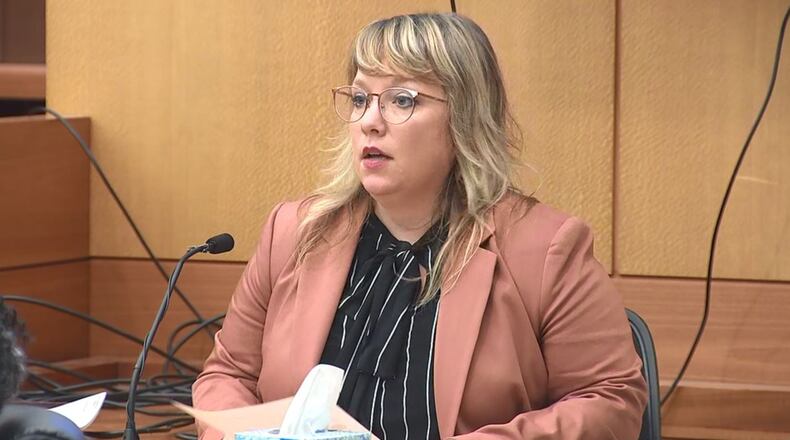This story has been updated with information revealed at trial.
A former city of Atlanta official told a jury Tuesday she acted on the orders of former Kasim Reed aide Jenna Garland to delay the release of water billing records of top city elected officials.
Lillian Govus, who once worked for the city’s watershed department, said she knew if she did not get approval from Garland before releasing public records politically damaging to Reed and others, she risked losing her job. The records in question showed that Reed’s brother, Tracy, and some City Councilmembers carried thousands of dollars in unpaid water bills.
Govus testified repeatedly she missed deadlines in early 2017 to provide documents requested by Channel 2 Action News because Garland had not granted permission. Govus is a key witness in the trial of Garland, a former press secretary to Reed, who is accused of two misdemeanor violations of the Georgia Open Records Act.
Garland is the first person to ever face prosecution under the records law.
“I knew if I didn’t clear these records with the mayor’s office, I would probably no longer have a position at watershed,” Govus told jurors. Govus was referring to emails that showed Garland inserting herself in the open records process, even though the mayor’s office itself was not the custodian of water billing records.
State law requires public agencies to respond to records requests from the public within three days and provide records as soon as they are available. It is a misdemeanor “to knowingly and willingly frustrat(e) or attempting to frustrate the access to records by intentionally making records difficult to obtain or review.”
Senior Assistant Attorney General Blair McGowan on Tuesday argued Garland was trying to save Reed embarrassment and that’s why she involved herself in Channel 2’s requests and ordered Govus to hinder the release of the records.
“This case is about open government and the defendant’s attempt to keep damaging information contained in public records from being released to the public,” McGowan said in her opening remarks.
Garland’s attorney, Scott Grubman, painted a far different picture of his client. Garland, 35, is a wife and new mother who proudly served a key role in the Reed administration, he said.
Grubman said Garland acted in good faith and records were ultimately provided “in a reasonable amount of time.” He said Garland’s texts to Govus to “drag this out” were “tongue-in-cheek.”
The state, he said, “must prove beyond a reasonable doubt that she intended to frustrate access to those records.”
“If the state can’t, you will be duty bound to provide a not guilty verdict,” he told jurors.
Request delayed for weeks
Channel 2 producer Terah Boyd requested billing records from four addresses on Feb. 28, 2017, associated with Reed and his brother, Tracy. Govus testified when records requests related to Reed were received it was customary to inform the mayor’s office, and she forwarded the request to Garland.
The city responded to the initial request in three days. But Boyd said she amended her request when she realized she incorrectly listed one of the four addresses as “Estates Drive” instead of Estes Drive.
A watershed official pulled records for Estes Drive and discovered balances at properties controlled by Mayor Reed and his brother.
Grubman argued the Channel 2 got the records it wanted in three days.
But Boyd said at the time it wasn’t clear she had the records she requested because of the mistake on the street name. So, Boyd amended her request to ensure that the station obtained all records associated with those addresses.
That amended request was delayed for weeks. In the meantime, Boyd testified, Garland called her to find out what she was working on, and Boyd said the station was tracking down various tips.
Following Boyd’s amended request, Govus testified Garland inserted herself again, and instructed Govus to “drag this out as long as possible,” and “provide information in the most confusing format available.”
Govus said she complied with Garland’s instructions, but unwillingly. Once fulfilled, the request included some new information not previously disclosed.
“Pulling records for billing and usage can be done within a matter of less than an hour,” Govus said, “and so to prolong the response to records requests for days or weeks is certainly outside the scope of what it takes to fulfill those records requests.”
Juror removed
Days after the city missed an April 7 deadline for a separate request for records for City Councilmembers, Channel 2 hired a lawyer, who sent a letter threatening legal action.
Govus said the day after the city received the letter, she was fired.
By the time Channel 2 got the records, at least one council member was able to pay off her bill and two other paid down their balances.
Govus said she turned over the text messages to Boyd so that she and Channel 2 would know she wasn't the one obstructing their request. A year later, in March 2018, she gave Channel 2 and the AJC permission to use the texts as part of an investigation into open records abuses.
The trial is expected to resume Wednesday with the defense’s questioning of Govus.
Also Tuesday, a juror was removed after informing the judge he’d seen a Monday AJC story on previewing the trial after being instructed not to watch news coverage. He was ordered to observe the remainder of the trial in the gallery, and the jury no longer has an alternate.
About the Author
Keep Reading
The Latest
Featured






